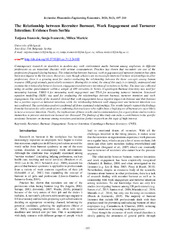Please use this identifier to cite or link to this item:
https://rfos.fon.bg.ac.rs/handle/123456789/2059Full metadata record
| DC Field | Value | Language |
|---|---|---|
| dc.creator | Ivanović, Tatjana | |
| dc.creator | Ivančević, Sonja | |
| dc.creator | Maričić, Milica | |
| dc.date.accessioned | 2023-05-12T11:27:49Z | - |
| dc.date.available | 2023-05-12T11:27:49Z | - |
| dc.date.issued | 2020 | |
| dc.identifier.issn | 1392-2785 | |
| dc.identifier.uri | https://rfos.fon.bg.ac.rs/handle/123456789/2059 | - |
| dc.description.abstract | Contemporary research on disorders in modern-day work environment marks burnout among employees in different professions as an important disorder with serious consequences. Practice has shown that recruiters are one of the professions frequently facing burnout. The relationship between burnout, work engagement and turnover intention has often been investigated in the literature. However, even though scholars are increasingly interested in these relationships in other professions, there is a growing need for studies evaluating the relationship between the three concepts among human resource (HR) professionals, particularly recruiters. Having this in mind, the aim of this study is to identify, understand and examine the relationship between burnout, engagement and turnover intention of recruiters in Serbia. The data was collected using an online questionnaire within a sample of 100 recruiters in Serbia. Copenhagen Burnout Inventory was used for measuring burnout, UWES-9 for measuring work engagement and TIS-6 for measuring turnover intention. Structural equation modelling (SEM) was used for evaluating the relationships between burnout, turnover intention and work engagement. The results of the research showed that work engagement has a negative impact on burnout and that burnout has a positive impact on turnover intention, while the relationship between work engagement and turnover intention was not confirmed. The correlation analysis confirmed all three examined relationships. The results largely support the findings from the literature for other professions confirming that employees who suffer from a high degree of burnout are more likely to have a turnover intention. Finally, the implications of these results and recommendations for organizations and recruiters themselves to prevent and decrease burnout are discussed. The findings of this study can make a contribution to the specific academic literature on burnout among recruiters and initiate further research on this topic of high interest. | en |
| dc.publisher | Kaunas Univ Technol, Kaunas | |
| dc.rights | openAccess | |
| dc.rights.uri | https://creativecommons.org/licenses/by/4.0/ | |
| dc.source | Inzinerine Ekonomika-Engineering Economics | |
| dc.subject | UWES | en |
| dc.subject | Turnover Intention | en |
| dc.subject | Recruiter | en |
| dc.subject | Engagement | en |
| dc.subject | Copenhagen Burnout Inventory | en |
| dc.subject | Burnout | en |
| dc.title | The Relationship between Recruiter Burnout, Work Engagement and Turnover Intention: Evidence from Serbia | en |
| dc.type | article | |
| dc.rights.license | BY | |
| dc.citation.epage | 210 | |
| dc.citation.issue | 2 | |
| dc.citation.other | 31(2): 197-210 | |
| dc.citation.rank | M23 | |
| dc.citation.spage | 197 | |
| dc.citation.volume | 31 | |
| dc.identifier.doi | 10.5755/j01.ee.31.2.24100 | |
| dc.identifier.fulltext | http://prototype2.rcub.bg.ac.rs/bitstream/id/655/2055.pdf | |
| dc.identifier.rcub | conv_2306 | |
| dc.identifier.scopus | 2-s2.0-85084443788 | |
| dc.identifier.wos | 000530873600007 | |
| dc.type.version | publishedVersion | |
| item.cerifentitytype | Publications | - |
| item.fulltext | With Fulltext | - |
| item.grantfulltext | open | - |
| item.openairecristype | http://purl.org/coar/resource_type/c_18cf | - |
| item.openairetype | article | - |
| Appears in Collections: | Radovi istraživača / Researchers’ publications | |
SCOPUSTM
Citations
15
checked on Nov 17, 2025
Page view(s)
10
checked on Dec 28, 2025
Download(s)
2
checked on Dec 28, 2025
Google ScholarTM
Check
Altmetric
This item is licensed under a Creative Commons License


